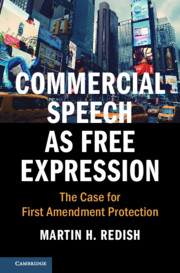Book contents
- Commercial Speech as Free Expression
- Cambridge Studies on Civil Rights and Civil Liberties
- Commercial Speech as Free Expression
- Copyright page
- Dedication
- Contents
- Preface
- Acknowledgments
- 1 Commercial Speech and the Values of Free Expression
- 2 False Commercial Speech and the First Amendment
- 3 The Right of Publicity, Commercial Speech, and the Equivalency Principle
- 4 Compelled Commercial Speech and the First Amendment
- 5 Scientific Expression and Commercial Speech
- Conclusion
- Index
5 - Scientific Expression and Commercial Speech
The Problem of Product Health Claims
Published online by Cambridge University Press: 21 May 2021
- Commercial Speech as Free Expression
- Cambridge Studies on Civil Rights and Civil Liberties
- Commercial Speech as Free Expression
- Copyright page
- Dedication
- Contents
- Preface
- Acknowledgments
- 1 Commercial Speech and the Values of Free Expression
- 2 False Commercial Speech and the First Amendment
- 3 The Right of Publicity, Commercial Speech, and the Equivalency Principle
- 4 Compelled Commercial Speech and the First Amendment
- 5 Scientific Expression and Commercial Speech
- Conclusion
- Index
Summary
In addition to summarizing the arguments made throughout this book, the concluding chapter anticipates and responds to two critiques of the book’s theory. The first of those anticipated critiques is that by recognizing what could arguably be deemed a “loophole” in the equivalency principle which allows for greater restriction of commercial speech when the harms caused by commercial speech are greater than those caused by comparable noncommercial speech, the theory advocated here would change the current doctrinal framework very little. This critique, however, ignores the numerous situations in which the Court has consistently provided reduced protection to commercial speech even though it fails to give rise to any more harm than comparable noncommercial speech. Acceptance of the theory advocated here, then, would dramatically alter the existing doctrinal framework, while preserving a common sense safety valve to take account of situations involving the compelling danger of harm. The second anticipated critique comes from the opposite perspective, namely that by so dramatically increasing the level of protection given to commercial speech, the equivalency principle would inevitably lead to a form of constitutional “dilution.” In other words, if both commercial and noncommercial speech are to receive equivalent protection, the Court will have to reduce protection for both categories to some form of lowest common denominator. Such an argument, however, begs the question that is the subject of debate: If, as argued in this book, commercial and noncommercial speech are of equivalent value, then there is no reason to fear application of equivalent constitutional treatment. In any case, this chapter argues that the greater danger is a form of “reverse dilution.” People are either sheep, or they are not. They are either capable of being trusted to make lawful choices on the basis of free and open debate, or they are not. Thus, if suppression of commercial speech is grounded in the fear that the people cannot be trusted to make such lawful choices and therefore debate must be censored by government, there is no basis for finding the people any more trustworthy to make political choices. The dilution debate thus reinforces the argument for the constitutional equivalency advocated throughout this book.
- Type
- Chapter
- Information
- Commercial Speech as Free ExpressionThe Case for First Amendment Protection, pp. 133 - 169Publisher: Cambridge University PressPrint publication year: 2021

